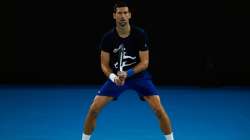Djokovic could be barred from French Open by vaccine pass law
"International Tennis Federation (ITF) protocols at major events meant an unvaccinated player would be entitled to enter France and participate in Roland Garros, which begins in May, said Roxane Maracineanu.

World No.1 Novak Djokovic could now be out from participating in the French Open after the country’s sports ministry that there would be no exemption from the new vaccine pass law and all the athletes must follow the rules of being vaccinated before entering the country.
The French Open is scheduled to take place in May.
Earlier, France's sports minister Roxane Maracineanu on January 7 said, "International Tennis Federation (ITF) protocols at major events meant an unvaccinated player would be entitled to enter France and participate in Roland Garros, which begins in May.
Djokovic would not follow the same organisational arrangements as those who are vaccinated," Maracineanu told FranceInfo radio.
"But he will nonetheless be able to compete (at Roland Garros) because the protocols, the health bubble, allows it."
Djokovic has already been deported from Australia after having his visa cancelled ahead of the Australian Open. As a result, Djokovic is now banned from Australia for the next three years, and he could now miss Roland Garros too.
"The rule is simple. The vaccine pass will be imposed, as soon as the law is promulgated, in establishments that were already subject to the health pass," the French ministry quoted as saying dalystar.co.uk
"This will apply to everyone who is a spectator or a professional sportsperson. And this until further notice. Now, as far as Roland Garros is concerned, it's in May. The situation may change between now and then and we hope that it will be more favourable. So we'll see, but clearly, there's no exemption," the ministry said.
(Inputs from IANS)